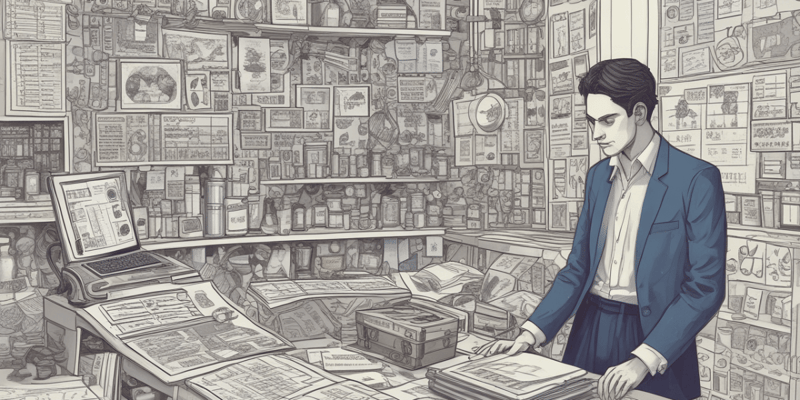Questions and Answers
According to Alfred Marshall, Economics is a study of what?
Mankind in the ordinary business of life
What does welfare mean according to Alfred Marshall?
Happiness or comfortable living conditions
Lionel Robbins' definition of Economics includes which of the following concepts?
Scarce means with alternative uses
Which economist introduced the concept of studying how men and society choose to employ scarce productive resources?
Signup and view all the answers
Which book was published by Lionel Robbins in 1932?
Signup and view all the answers
According to Samuelson, what makes his definition of Economics dynamic?
Signup and view all the answers
What does Economics focus on according to its subject matter?
Signup and view all the answers
What is one of the key features of Robbins' definition of Economics?
Signup and view all the answers
According to Marshall, what is not clearly defined and varies over time and place?
Signup and view all the answers
What aspect did Samuelson emphasize in his definition of Economics that differs from Robbins' viewpoint?
Signup and view all the answers
Study Notes
Economics: Meaning
- The word "Economics" originates from the Ancient Greek "oikonomikos" (oikos means "households" and Nemein means "management", "custom", or "law").
- Economics means "management of households".
- The term was once known as "Political Economy" and was later renamed as "Economics" by Alfred Marshall in the late 19th century.
Economics: Its Nature
- The nature of Economics refers to its contents and why it is included within the subject.
- Various definitions of Economics have been provided by notable economists.
- Economics is a social science, meaning it studies the behaviors of people in society.
Adam Smith's Wealth Definition
- Adam Smith defined economics as "the science of wealth" in his book "An Inquiry into Nature and Causes of Wealth of Nations" (1776).
- Smith's approach emphasizes how wealth is generated and increased.
- He posits that individuals in society inherently seek to improve their own well-being and are guided by an "invisible hand".
Marshall's Welfare Definition
- Alfred Marshall's definition of economics prioritizes welfare over wealth.
- Economics concerns the experiences of ordinary people who are motivated by love and not solely by the desire for economic gain.
Criticisms
- For Adam Smith, economics is about getting activities and "wealth-spending".
- Marshall's definition focuses on the welfare of ordinary people.
Introduction to Micro Economics
- Economics is everywhere, and understanding economics can help one make better decisions and lead a happier life.
- A subject should have a name or title that facilitates a clear and correct understanding of its contents.
Learning Objectives
- To acquire a fundamental knowledge of Economics and its nature and scope.
- To understand the meaning of basic concepts of Economics and their application in various definitions.
Kinds of Goods
- Free Goods: Available in nature and in abundance, with no expenditure required to own or use them (e.g., air, sunshine).
- Economic Goods: Have value in exchange and are consumed by paying a price (e.g., food, clothes).
- Perishable Goods: Short-lived goods that spoil quickly (e.g., fish, fruits).
- Durable Goods: Goods that can be used for a long period (e.g., table, chair).
Public vs Private Goods
- Public Goods: Available to everyone, with benefits that spill over to others who did not pay for the good (e.g., national defense, law enforcement).
- Private Goods: Consumed by a single person or household, with benefits accruing only to the individual who pays for the good (e.g., food, drinks).
Services
- Produced and consumed, with characteristics such as:
- Intangible
- Heterogeneous
- Inseparable from their makers
- Perishable
Milton Friedman
- Popularized the saying "There is no such thing as a free lunch", meaning that someone has to pay for the benefits received.
Utility
- Meaning: The want-satisfying power of a commodity or service.
-
Characteristics:
- Psychological
- Not equivalent to usefulness
- Not the same as pleasure
- Personal and relative
- Function of the intensity of human want
- Subjective concept
- No ethical or moral significance
-
Types of Utility:
- Form Utility
- Time Utility
- Place Utility
- Service Utility
- Possession Utility
- Knowledge Utility
Measurability of Utility
- Wants of a person are satisfied by the act of consumption.
- The consumer derives utility, measured in terms of "Utils".
- An "Util" is a unit of measurement of utility.
- Marshall states that utility can be measured indirectly using the medium of money.
Price
- The value of the good expressed in terms of money.
- Fixed by the forces of demand and supply of the good.
- Determines what goods are to be produced and in what quantities.
- Decides how the goods are to be produced.
Market
- A place where buyers and sellers enter into an exchange of goods and services over a price.
Cost
- The expenses incurred to produce or acquire a given quantum of a good.
- Together with revenue, it determines the profit gained or the loss incurred by a firm.
Revenue
- Income obtained from the sale of goods and services.
- Total Revenue (TR) represents the money obtained from the sale of all the units of a good.
- TR = P x Q, where P is the price per unit of the good and Q is the total quantity of the goods sold.
Equilibrium
- Stable Equilibrium:
-
Particular Equilibrium and General Equilibrium:
- An equilibrium, when it pertains to a single variable, may be called particular equilibrium.
- An equilibrium, when it relates to numerous variables or even the economy as a whole, may be called general equilibrium.### Goods and Services
- Goods and services satisfy human wants
- In Economics, "goods" implies "services" unless specified otherwise
Types of Goods
- Goods are tangible, have physical dimensions, and can be preserved over time
- Goods exist independently of their owner and are transferable
- Goods have value-in-exchange
Kinds of Goods (and Services)
- Free goods: available in nature, abundant, and do not require expenditure (e.g., air, sunshine)
- Economic goods: have value-in-exchange and require expenditure (e.g., water)
- Capital goods: do not directly satisfy consumer wants, but help produce consumer goods (e.g., machines)
- Perishable goods: have a limited lifespan and can be easily destroyed
- Durable goods: have a longer lifespan and can withstand wear and tear
Public vs. Private Goods
- Public goods: available to everyone, regardless of who pays and who doesn't
- Private goods: refer to opportunity cost, where someone has to pay the cost of producing benefits
Wealth Definition: Different Perspectives
Adam Smith (The Classical Era)
- Definition: Economics is the science of wealth
- Key point: Wealth is created and increased when individuals pursue their self-interest, guided by an "invisible hand" that promotes the collective good
- Criticisms: Overemphasis on material wealth, neglecting human welfare, and ignoring religious and spiritual values
Alfred Marshall (The Neo-Classical Era)
- Definition: Economics is a study of humankind in the ordinary business of life
- Key point: Focus on welfare and how it is influenced by both material and immaterial factors
- Criticisms: Definition of welfare is not clear, and overemphasizes material things over immaterial services
Lionel Robbins
- Definition: Economics is a science of choice
- Key point: Focus on scarcity and how individuals make choices under these constraints
- Criticisms: Fails to distinguish between goods that contribute to human welfare and those that do not
Scope of Economics
- Economics is concerned with human beings and their activities related to wealth
- Economics is an art and a science, providing guidance for solving economic problems
- Economics is a positive science, analyzing problems based on facts, and a normative science, examining what ought to be
Economics Definitions
Alfred Marshall (The Neo-Classical Era)
- Definition: Economics is a study of mankind in the ordinary business of life
- Focus on welfare, which means happiness or comfortable living conditions
Lionel Robbins (The New Age)
- Definition: Economics is a science that studies human behavior as a relationship between ends and scarce means with alternative uses
- Key points: Unlimited human wants, scarce resources, and alternative uses
Paul Samuelson (The Modern Age)
- Definition: Economics is the study of how men and society choose to employ scarce productive resources to produce various commodities over time and distribute them for consumption
- Key points: Scarcity, alternative uses, and dynamic nature of economics
Studying That Suits You
Use AI to generate personalized quizzes and flashcards to suit your learning preferences.
Description
Learn about the meaning and nature of economics, including its origins and evolution as a field of study.




